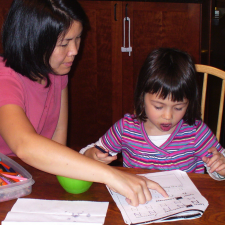
In her book The Battle Hymn of the Tiger Mother, Yale Law professor Amy Chua described the high-pressure parenting style common in much of East Asia and ignited an international debate: Do Tiger Moms really push their kids to excellence, or do they crush them with expectations?
The answer? It depends on the family’s culture, find Clash! coauthor Hazel Rose Markus and Stanford cultural psychology graduate student Alyssa Fu. In their recently published research report (FuMarkus2014), the researchers document that Asian-American kids thrive on pressure from their Tiger Moms, but European-American kids balk at parental demands.
In one study, for example, Fu and Markus asked Asian-American and European-American students at a California high school to complete difficult word puzzles. Half of the participants were randomly assigned to the mom condition, in which they described their mother after learning they had scored poorly on the first set of puzzles. The other half of the participants were randomly assigned to the control condition, in which they described themselves after their unsuccessful first round. Fu and Markus found that Asian-American participants in the mom condition worked harder on a second set of puzzles after describing their mothers than did European-American participants in the mom condition. In contrast, European-American participants attempted more puzzles after describing themselves than after describing their mothers. These results suggest that parental connections help Asian-American students but hinder their European-American counterparts.
Fu and Markus explain that Western children are taught from a young age to be independent, unique, and separate from others—including their own mothers. In Asian-American families, however, children learn the value of being interdependent, similar, and connected to others—especially their mothers.
So is it better to be a Tiger Mom or a cool mom? The answer depends on culture. Most European-American children have been coached in the merits of independence, and so they resent parental pressure. In contrast, most Asian-American children feel highly interdependent with their mothers, and so they perceive parental pressure as support.“When Asian-American kids see themselves as really connected with their mothers,” writes Fu, “they can benefit from their mother’s pressure.”